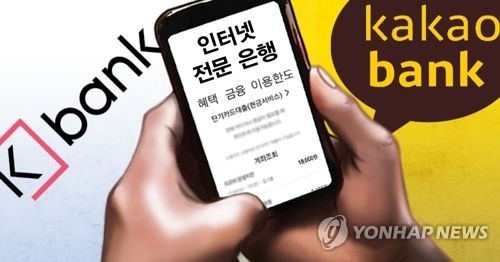The successful first day of Kakao Bank, South Korea’s second internet-only bank, not only signaled a new era of mobile banking but is also pushing conventional banks to depart from their loan-focused business model.
While recognizing Kakao Bank’s expanded interest benefits, financial supervisors have recently been adding pressure on leading banks to take more risks and boldly invest in new industries.
KaKao Bank, a mobile platform-run banking service, attracted over 300,000 accounts after its first day of operations.
As of 8 a.m. on Friday, its number of accounts stood at 300,500, its total amount of deposits at 74 billion won ($66 million) and amount of loans at 50 billion won, according to officials. K bank, another internet-only bank that began operations in April, had reached 240,000 accounts in 24 days.
Based on the nation’s most widely used messenger KakaoTalk, the new bank is set to offer higher deposit rates and lower lending rates, as well as commission fees for outgoing foreign wire transfers that are one-tenth that of traditional banks.
 |
(Yonhap) |
At a launch ceremony, Financial Services Commission Chairman Choi Jong-ku expressed hope that Kakao Bank would bring overwhelming changes to the financial market.
“I believe that these innovative financial services, once activated, will create a virtuous circle and trigger a job creating effect in the market,” he said, adding that Kakao Bank is likely to boost some 2,470 new jobs over the next three years.
His optimistic stance contrasted with his recent addresses to conventional banks, especially the market’s top players, which recorded record-high profits in the first half of the year.
“(Korean banks) are heavily leaning toward household loans and real estate loans, while dodging productive sectors such as innovative SMEs,” Choi said at a press briefing Tuesday, criticizing banks for their “pawnshop-style” operations.
The four biggest banking groups -- Shinhan Financial Group, KB Financial Group, Woori Bank and Hana Financial Group -- posted a combined 5.88 trillion won in net profit during the first six months of the year.
The lucrative banking business, however, has been drawing concern from financial authorities, as a rising proportion of their profits has been coming from household lending and secured loans.
The household loan ratio at most of the banks went as high as 68.5 percent as of the end of last year, a surge from 50 percent in 2009.
Such overvaluation of individual loans not only added to the nation’s 1,400 trillion won household debt, but also reduced funding opportunities for budding small businesses, according to observers.
Meanwhile, conventional banks are focusing on expanding their services for the senior age group and foreigners, noting that these customer groups are Kakao Bank’s weakness.
As the new mobile banking service requires neither certificate verification nor a physical visit to a bank, calls have been rising from foreign nationals here to be allowed admittance. The lender explained that such expansion may come in the later stage of the business.
By Bae Hyun-jung (
tellme@heraldcorp.com)








